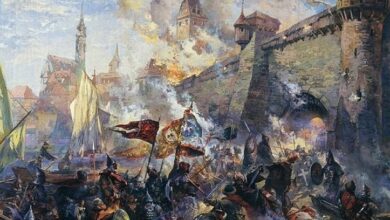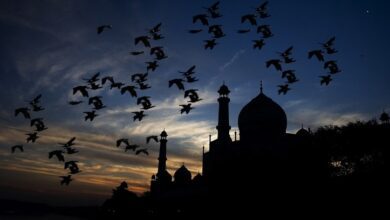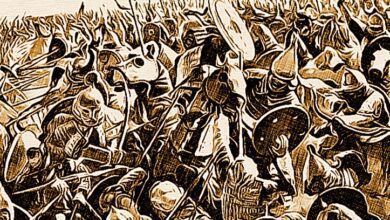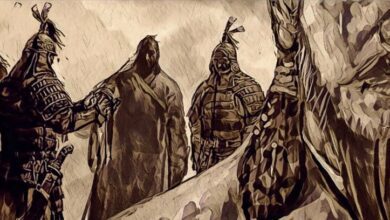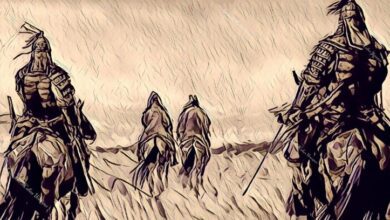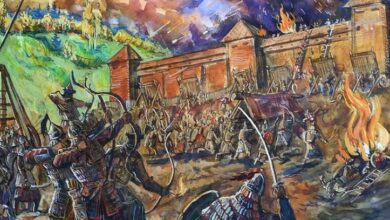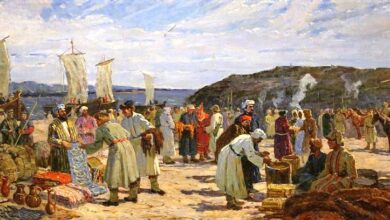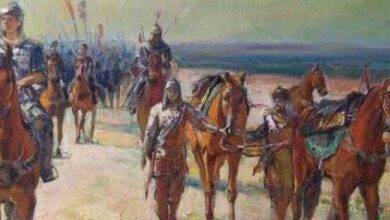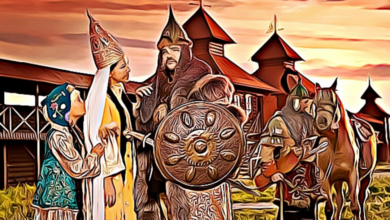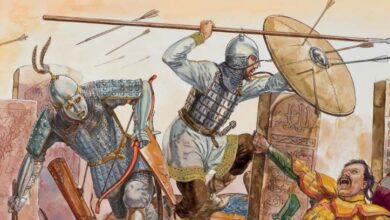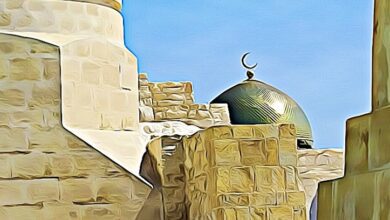
Ghazi Baraj Tarihi. Chapter 18
AT In 1118, Adam unexpectedly died, and Shamgun became a Kan. Before Adam's death, subashes and small owners, devastated by the Oimek and Kuman raids, began to ask for relief in taxes. Immediately after the death of Adam, the Baytyubians began to expel the Bilemchey Chipoviks, and in Bulyar itself they raised a revolt against the city magistrate. The magistrate in the capital, as well as in other large cities, was called "Suvar Yorty", because the people called "suvari" merchants and craftsmen (ostalar) - the owners. The rebels beat several of his Suvarbash and Bilemchey. Despite Yakub's warning, Shamgun decided to suppress the discontent by force and summoned a kursybay. Subash refused to play the role of a punisher, and then the Kan, in annoyance, dismissed the kursybai and ordered Subash to come with a confession. Subash hid in Mardan, which did not betray the fugitives. Then Shamgun summoned the Bulgarian and Suvar Kazanchis, and they crushed the rebellion with pleasure. And they boasted of doing the same in Mardan. Out of hatred for the Mardans, they called them, and Bandzhu, and the entire Mardan-Bellak "Burtas". This pissed off the Mardanians, and they deliberately began to call the smallest city in their province - Razi-Suba - "Suvar" ...
After all this, the Kan, not feeling safe in Bulyar, moved the capital to Bolgar ...
In 1120, Kolyn, having entered into an agreement with the bek of Balyn Djurgi, decided to overthrow the people of Shamgun, who had lost love, with his hands. On his orders, Balus let the fleet of the Balyns pass through the Martyuba, and Dzhurgi suddenly laid siege to the Bolgars.
No one supported the Kan, and he had only 50 juras left at hand. But even with them, he tried to disrupt the landing of the Uruses, however, having lost half of the people, he was forced to retreat to Mumin. The Bulyars and Mardans did not send any help, and the Kazanchis calmly awaited the capture of the citadel by the Uruses. Djurgi, however, hesitated, as he lost 1250 of his warriors in the battle with the djurs and the inhabitants of the bal and kov of Boltar robbed by the Uruses. Then Shamgun, who was simple and unassuming in character, although quick-tempered, like his father, took it and announced to the people about the decision to ease taxes. Ordinary townspeople immediately formed a militia and stood on the walls, and the Bulyars, who had not suffered from the massacre, hastily sent their detachment to Bolgar. This forced Kolyn to drive up to the citadel and declare to Shamgun: “Kan! You see what's happening! Give Bolgar to me, faithful to you, and go to reign in Bulyar yourself!
121
Realizing that the combination of the Kazanchis with the Uruses would be disastrous for him, Shamgun followed the advice of Selim, who was sympathetic to him, and went to Bulyar. So Bulyar again became the capital. And Kolyn, so that the Kan would not suspect him, attacked the Dzhurga camp with his Suvars and the fleet under the pretext of punishing him for slowness and cowardice. Seven thousand out of eight Uruses were cut down, trampled and sunk by Kazanchis and Salchis. Dzhurgi barely managed to escape with the last thousand and never again in his life thought about a campaign against the State.
His father Altyn-Kalgan wanted to execute Dzhurgi for the loss of an army, but, having learned about the capture of 25 Djur armor, he said: “God be with him! The armor is excellent, and if the Bulgars sold them to us, I would give them even more lousy men for them!” Nevertheless, my father once saw a Urussian book in the possession of the Balyn Bek, in which it was written about the victory of Dzhurga in this Kolyn war. When he remarked to the bek that this was not true and told how it was according to Yakub's testimony, the bek laughed and remarked: “We have different concepts of victory. It is important for us that Dzhurgi defeated Shamgun and took away the booty that was dear to us, but how many people the Kan had and how many men we lost in the battle is not important for us.
Both my father and myself, when we were in Rus', never ceased to be surprised at the contempt and indifference with which the Urussian beks treated their people. And we also noticed that the Balynian books did not write about what happened in the neighboring, Urussian bekstvos, unless they were especially worried about it ...
And the Uruses are very different people, and they are very susceptible to hobbies - good and bad. So, a person who writes about this people through a short acquaintance can write very bad and very good things about him, but both of them will be true.
In general, in order to know them well, you have to live among them for a long time ... Their nobility towards you can coexist in them with deceit and ruthlessness towards others. Grievances from stronger neighbors made the Uruses prone to inconstancy, deceit and deceit.
And bek Kushtandin told his father that drunkenness was the calamity of his people, and that some people are inclined to blame the spread of this “badness”. But their false teaching has nothing to do with it. In fact, this is from an old pagan custom. Once upon a time, the Ulchians were the kindest people, incapable of shedding anyone's blood, even a criminal. But then they experienced the terrible attacks of the enemies, and they had to fight. Their kahins (wizards), which the Khons called boyars, began to give the soldiers before the battle intoxicating for courage. Intoxicated was also given to people after battles, so that they could survive the terrible losses that they suffered. So the people got used to drunkenness, and then this pagan
custom corrupted many of their clergy - priests. Such paiaz should have been executed, but they could not, since they were the only force opposing even wilder pagan customs. In addition, the priests also drank in order to win the love of the drinking flock. So it turns out that sometimes the papases drink more than the parishioners. So, while I was in Balyn, one drunken priest choked on soup, which he drank directly from the cauldron after the blessing of the fishermen for fishing ...
And when the Urus drinks, he becomes either very kind, or very vicious and bloodthirsty. Moreover, the good can become evil, and the evil can become good. By the way, this is what our merchants use when they want to buy something cheaper from the Urus merchant, and most often they win ...
They say that Djurgi, having returned from the campaign, drank heavily and, becoming furious, ordered the aged Akhad to be executed immediately. Moreover, he entrusted the assassination to the Kisan bek Ar-Aslap, a third of whose troops were killed at Bolgar. Then, after the death of Altyn-Kalgan, who was afraid to irritate the Kan and apologized to Shamgun for the unauthorized raid of his son, Ar-Aslap, also at the instigation of Dzhurga, closed the Khorysdan path. The son of Ar-Aslap from the kaubuyka, Ryshtauly, opposed this and was thrown into prison by his father. From the prison he was helped to escape by a servant - Kaubu. Ryshtauly arrived at Kolyn, was treated kindly by the emir and sent home with a kursybay in the winter by the son of Subash, Khalik Kanjaly, who had come over to the service of Selim.
The Mukhshans, who disliked Ar-Aslap for servility to Balyn, opened the gates of Kisan, and the kursybai entered the city in perfect order and without the robberies accompanying the war. Young Ryshtauly immediately sat on his father's throne, and Ar-Aslap ended up in his own dungeon, in which he soon died of grief.
Pleased with the peacefulness of Kanjaly, the Kisans immediately released the previously captured Bulgarian merchants and paid a huge tribute - a skin of an excellent squirrel from the yard. True, the joy of victory was overshadowed by the sadness of the new bek. He learned that the heartless father, in retaliation for his flight, told his mother that Ryshtauly had drowned in the river. Bek's mother died of grief, and Ryshtauly called her at the grave in vain. The bek's grief was such a pitiful sight that even the stern Kanjaly began to cry like a child.
Ryshtauly became a faithful ally of the State, despite the temptations, instigations and threats coming from neighboring Urussian beks. He was the first Urussian bek to whom, out of respect for him, the State gave the title of emir, that is, great bek. By this he was equalized with the great beks of Bashtu ...
He was much annoyed at first by his brothers, born of other wives of his father. They fled to the Cumans of Bonyak and fought with him against Ryshtauly, until Kanjaly came again two years later and slammed them all in the fortification of Boryn. Only one of the offspring of Ar-Aslap managed to escape and fortify himself with the help of the Balyns in Kan-Mukhsh. The remaining five were put in place, as they decided to resist and stained themselves with the murders of merchants.
122
123
Kanjaly overtook the escaped Bonyak on the field, which was called "Halek". The ill-fated Khan tried to fight back in a fortification made up of wagons on the banks of the Shir, but was tied ...
Kanjaly gave Bonyak Ryshtauly, who gave him to Ulubiy Basht. They say he was forced to accept the false teachings of the Nasrans and died in a monastery.
Kanjaly received the nickname Boryn for this victory. The Khorysdan way was opened, which reassured the merchants...
Instead of Kolyn, the Mardans elected Balus' son Haydar as Ulugbek. When Balus complained about this to the Bellaks, they replied: “You made us fight too much, but Haidar is peaceful. Besides, Haydar is your son, and you should rejoice in his exaltation.” Balus's complaint was also rejected by Selim with the words: "I cannot but take into account the decree of the kan and the will of the Mardans - otherwise I will look like a criminal."
Emir Kolyn-Selim was one of the wisest men of the State, who put her interests above his own, but at the same time knew his own worth. It was easy for him to overthrow the Kan, but he saw the danger of Kazanchi's dominance, which was restrained only by his tacit alliance with Shamgun...
In 1135, when the Kan went to Baraj to repulse the daring raid of the Kara-Oimeks by Khan Manuk, Mullah Abu Hamid from the Garnat kingdom honored the State with his visit. Unfortunately, my grandfather Arbat Os-Laj, who was earlier Ulugbek of Bulyar, and after the Kolyn War was transferred to the post of governor of Saksin, separated from Bellak at the same time, showed indifference to matters of faith and therefore did not show Abu Hamid proper honor. More affectionate was another son of Shamgun, Emir Otyak Ulug Mohammed Dzhangi, who replaced his father in his absence in Bulyar...
Mullah, as is typical of great preachers, refused to enter the Kan's palace, and then the emir honored him with a pleasant conversation in Altyn-munch. Seyid Yakub met the mullah with even greater courtesy. At his request, the descendant of Atrak ibn Musa, the owner of a large trade and craft house, Abu Bekr ibn Ahmed, provided the mullah with one of his houses for residence.
In a conversation with the seid, the mullah admitted that what he saw in the State surpassed everything that he had heard about it before. Mullah's son Idris stayed in Bulyar to study at the Mohammed-Bakiriya house of sciences, and the mullah, after getting to know the country, went on business to Rum along Khorys-Yula. On the way he visited the beylik of the Kaubuys, among whom Yakub successfully spread the light of the true faith, and prayed in the mosque of the Kaubuy capital Kyr-Kub near Batavyl. The mosque was called “Baryn” by the Kaubuys, in honor of the alia of the victory of Buri. Yakub had to come to terms with this so as not to alienate the Kaubuians from the faith...
That campaign of Shamgun was the last for the Kan. His Baytyubin militia was surrounded by the Oimeks of Manuk, and only the kursybai Kanjalyya, who arrived in time on the orders of Kolyn, was able to overturn them. When the Oimeks fled, the Kan angrily said to Khalik: “Why did you violate my decree and not disband the corps?” And the kursybay was saved thanks to the funds of Selim. Here, the cautious emir decided to ignore the will of the king, because the State could not do without the kursybay.
The Sardar was saved from a difficult situation by a poisoned Oimek arrow fired by a fleeing Kypchak. She slightly scratched the Kan's open face, but the poison soon killed Shamgun.
Kanjaly, in a rage, sent his arrow, which pierced through Manuk's head, and then caught up and without any mercy destroyed the entire army of the khan ...
The support of Kolyn fell, and he did not dare to oppose the Kazanchis, who raised Anbal to the throne. However, he soon approached Bulyar together with the kursybay Kanjaly and offered the Kazanchis to conclude an agreement with him in the presence of the Kan. And so that the uhlans did not evade negotiations and did not take rash actions, he warned that he had given Kanjaly and Haidar the order to storm the capital in the event of a disruption of the meeting. Then Selim calmly went alone to Suvar Yorty, to the circle of the Kazanchi pack, and declared there: “A good politician is a good merchant. So let's have a bargain."
They say that in the Magistrate the cry was stronger than in the market. More than once the uhlans advanced on Kolyn with their weapons drawn, but in the end they were forced to come to an agreement with him.
The agreement was as follows: the Kazanchis were exempted from military service and from the tax from estates; the territories of the Subash regions in Northern Dzhebelstan, that is, on the right bank of the Kara-Idel of the Martyubinsk, Suvar and Bolgar silts, were halved in favor of the Kazanchis, and all lands along the Alat River in the Martyubinsk district of Kukdzhak were also transferred to the ulans; the funds of the Kan court increased tenfold at the expense of the state treasury and could increase only if the income level of 1135 was exceeded; Selim received for life the post of Ulug-bek Bolgar, the right to control government officials and the treasury, Suvar Yorty in Bolgar, Nur-Suvar and Saksin, the foreign policy department, Kashan, Saksinsk, Ursk and Biysuy provinces of the State; Mardan-Bellak retained his rights...
124
125
After the negotiations, Kolyn went to Bolgar, handing over what he had ceded to the Kazanchis to be torn to pieces. Kursybay inseparably stayed in the areas transferred to the ulans, so that during the division they would not kill all the subashes and each other ...
Kan, handing over the business to several favorites, took up hunting, revelry, burdensome trips for the population through the intra-Bulgarian silt pits of Baityub, Tamta, Martyub, Suvar and Kashan, during which the case rarely went without robberies and murders of subashes, without defiling the honor of the wives and daughters of the Kara- chirmysh and ak-chirmysh. Seid Yakub, who decided to contradict the Kanu in writing and orally, was deprived of his tongue and eyes and soon died. They say that in his last days, deprived of everything, he earned his living by playing dombra in the market. And his house of sciences was turned into a den, where the Kan himself often drank, surrounded by ulans and their mistresses. The favorite entertainment of Kingpin and his flock was the decomposition of chaste shakirds by forcibly drinking and imposing vicious women, who, in half-dressed form, were put on the knees of unfortunate students.
The grandson of Yakub Kul-Daud, who returned from the hajj (during which he fell into slavery and was ransomed by the Khondzhaks for a silver jug in the Tatyak region), was so horrified by this situation that he organized a brotherhood of Sufis and dervishes at the El-Khum mosque in Nur -Suvare and told the brothers: “Allah deprived the Bulgars of his mercy due to the spread of the infection of unbelief. Include new members in the circle of our brotherhood "El-Khum" and pray and truly believe for two, three, five, ten ordinary believers. When the strength of our faith is equal to or exceeds that which would be in the case of the introduction to Islam of all the unbelievers of our State, then the Merciful Creator will save us.”
Each member of the brotherhood sacrificed all his property and lived on funds received from El-Hum, and no richer than kurmish, called for the rejection of luxury, war, all types of oppression and slavery, hypocrisy and deceit of one's neighbor. In Bulyar, the brothers, led by the son of Abu Hamid al-Garnati Idris, settled in a part of Khinuba. Among the brothers there were many subashes and ak-chirmishes who sacrificed their property under the threat of its capture by Kazanchis ...
In 1153, the uhlans, who hated the brotherhood, captured Idris and tortured him. After that, the brothers moved to the outer balik of the city of Saklan and named their uram Tatyak there, and in the capital, the palaces of the Kazanchis began to light up one after another ... No new defeats of the khanaka of the dervishes could stop these arsons. When the brutal Kazanchis surrounded the El-Khum mosque in Nur-Suvar, Suvar Yorty rose to defend the brotherhood, setting up his militia to guard the khanaka. Suleiman, the cousin of the father of Kul-Daud, Suleiman, who was the son of the Saksin seid Daud, and himself a Nur-Suvar and Bulyar seid, urged Kolyma to intervene immediately, and the emir did not miss the opportunity to hurt the Kazanchis. He squeezed Nur-Suvar with the Bulgarian militia and the kursybay of the son of Kanjaly Kurnay, as well as the Arbugins, who had no idea of fear or pity in the war, and declared: “Our State arose and flourished by the will of Allah. Now, some infidels are going to exterminate all the most faithful of the faithful in order to deprive her of the mercy of the Creator. This cannot be tolerated, and at the first new murder of a dervish, I will trample the guilty into the dust.
Kazanchis, clicking their teeth, retreated, although in secluded places, when the opportunity arose, they continued secretly to settle scores with their brothers.
On that goal, Abu Hamid al-Garnati again arrived in Bulyar and met the open hostility of the Kan and his hangers-on. Abu Bekr was no longer in the capital - fearing the robberies of the Kazanchis, he moved to Bolgar. Suleiman barely found for him a miserable dervish shack in Tatyak, into which the corpse of his son was brought to him. Our people expected sorrowful cries and lamentations, but the mullah only said: “He left this world by the will of Allah in the name of a better one,” and began to pray fervently. Abu Hamid arrived along the Khorys-Yula through the Bandzha, which the Arabs called after the local holy stream Nut, and was very surprised at the changes in the State. His friend Emir Otyak fled from the Kazanchi under the wing of Kolyn as Ulugbek Saksin, and the Muslims sighed and secretly complained to the Creator about the hardships ... However, external affairs, thanks to Selim, were good. The death of Manuk forced the Kara-Oimeks to subdue, and after negotiations with the envoy of Kolyn Kurnay, they agreed to submit to the State and form the province of Tubdzhak subject to it. Only one Oimek Khan, Bashkort, decided to remain independent and, thanks to the help of Otyak, peacefully crossed over with his Oimeks to the Cuman steppes through the Saksin. The Bukhara or Khorasan turbidity again became calm ...
The Balyn Bek Dzhurgi tried to plant his governors in Kisan, but every time he was rebuffed.
In 1140, one appearance of Kurnay was enough for the Balyn troops to flee from Kisan ...
126
127
In 1150, Dzhurga's son Khan-Tyurayi dared to refuse to pay tribute to the Djir. At the same time, the Galidjians began to disturb the Biysu region with their raids: Nukrat ... and even the surroundings of the Tuimas-Artan prison on the Biy-su River, where Sadum ships entered from the Chulman Sea and hunters, fishermen and shepherds of the Tupaya (Northern) tribes - Tunais - came to trade ...
And Tuymas-Artai was founded by the Bulgarian merchant Tuymas, who traded with Artan, at a time when Ugyr Bashtu closed the Argan route through Galidzh, the Shudish kuyai family, famous for trading in excellent hare skins, was guarding the prison,
And Yakub wrote that under Mar these skins served as money and were called "barmal" - as the Shuds called the Bulgars. And the first coins, minted at the insistence of Mikail under Bat-Ugyr Shamsi-Malik, were also called "barmals" ...
Alarmed by the behavior of the Ulchians, Kolyn called Kurnay and told him: “I helped you and your people in a difficult time for the well-being of the State. Now the time has come for you to pay me off and make a big trip to Tunai "...
In the winter of 1150, they marched together at the head of the Kursilbay and Ak-Chirmysh to Tunay, where they laid the foundation of a new center of Biysu - the city of Kolyn near the Nukrat balik on Nukrat-su, defeated several Galidjian fortresses on the Tun River and finally laid siege to Ar-Aslan and left it , having received a squirrel skin from each yard.
After that, Khan-Tyurayai invaded Kara-Mukhsha and captured Kisan, but Ryshtauly, who fled from him, along with the Mardans who arrived in time, the son of Haydar bek Baychura, quickly rectified the situation ...
It is said that Ryshtauly again came to Kisan at dawn with a small retinue and, after a short skirmish, rushed to run. Khan-Tyurayai, who had been celebrating the victory all night, could not get out of bed and sent his governors after him. They were ambushed by Baychura and were killed without any mercy by the Arbugins.
A few of the survivors rushed back to the city with terrible cries and caused a commotion in it. Khan-Tyurayai, having learned about the death of the governor, barely had time to gallop from Kisan to Balyn - half-dressed and in one boot. The remnants of his army rushed after him. Baychura made Bek Ryshtauly in the city, and then drove the Balyns out of Kan. The bek did not do robberies, but he took a squirrel from the yard from Kan. Two years later, the Balyns again captured Kisan from Ryshtauly and robbed the Bulgarian merchants. In response, Kurnay and Baychura burned the regions of Kisan, Kan and Bulymer in winter.
In the same year, Emir Kolyn died, and the State plunged into the darkness of the Kazapchi excesses for ten years. Kursybay was fluffed up. The Cossacks, like hungry wolves, broke into the Subash regions and began to push the Igepcheis into the wilds. The occupied lands of the Lancers were settled by Serbs and Ars, who were captured in open raids on the lands of the treasury.
128
Ulugbek Martyuby Os-Laj did not interfere, fearing for his life. Seyid Suleiman, horrified by what was happening, fled to Emir Otya'k in Saksin, but soon he too had to flee to his father-in-law Bashkort. Kul-Daud, appointed by the seid of Bulyar at the request of the Suvarchis, barely kept the unbridled Kazanchis from destroying the Suvarchi houses. Collectors of taxes increased two or three times were rampant everywhere. When the authorized Kans came to Bandja with a message that the tribute from Mardan had been doubled, Baichura exclaimed: “Not a single foreign enemy oppressed us more than our own Kan!” Although the bek paid tribute, these words were not forgotten to him...
In 1117, the son of Khan Sharafkhan Sarychin nailed to Saksin. Not trusting any of his own, the Kan appointed Sarychin's son As to the vacant post of Tarkhan Saksin. And here and in the provinces of Biysu, Mardan-Bellak, Ura, Tubdzhak, the governors were called Tarkhans, and in other ils - Ulugbeks (or, sometimes, Ulubiy). Since the Saksins looked at the new Tarkhan as a robber, he spent a significant part of the time in the village of Bekhtash, from where the path from Idel to Shir began. Then, nevertheless, the inhabitants of the Saxin Suvar took pity on him, and he transferred his Court to this city ...
The khan, offended by Bashkort, was afraid of attempts by the Oimeks and therefore summoned his brother Atrak, who served there, from Gurji. Atrak, however, was not long in the service of the State and fled under the wing of Bashkort.
In this bleak time, only Arbat remained calm, for he was guided by the words spoken by seid Bakir to the Bulyar rebels and embarrassed them: “Entrust your life and fate to Allah!” […]
Deciding to build up the Yugarykerman wasteland, he prepared stones and asked the son of Kuchak-Kachkyn Aslan to build several beautiful buildings. Aslan and his students erected the palace of the bek and the large gates of the Ulugbek Court, wonderfully decorated with stone leopards, lions and other images, but the attack of Otyak stopped the construction. Envying the craftsmen, the Balyn biy hired Aslan and his assistants for huge money, and they erected exactly the same structures for him. And some of the stones that became unnecessary were taken to Balyn and several churches were built from them ...
129
Otyak, exhausted by the inconveniences of the wild steppe life, left his father-in-law and moved to Bashta, where in 1159 his wife gave birth to his son Gabdulla ... He was a small likeness of the grandfather-khan, and Bashkort doted on him and often came to Bashta to see his son-in-law grandson. The Uruses not only did not interfere with this, but even rejoiced, since at that time there was peace between them and the Saklaia Kypchaks, who were led by Bashkort.
After living for some time in Bashtu, Otyak moved to Balyn to Hats-Tyuray, who promised to help him take his father's throne ...
Meanwhile, Anbal was doing everything to lose the throne. The atrocities of Kazanchis and officials, which affected everyone except themselves, caused general hatred for the Kan ... Ak-chirmyshs of Kukdzhak and subashis of Arsu united with the Ars and began to repulse the rapists. At the same time, the former kursybays of Kermek, and now subashi, finished off the tax collectors. The Bilemcheis tried to commit excesses in the villages of Kermek, just as they did in the villages of other provinces, but the stern bakhadirs, who were not used to this, laid them down on the spot. Baychura immediately declared that he would stand at one with Kurnay, and the frightened Kan decided to overcome him with cunning. But first he sent his son Sarychin to Martyuba. Knowing the situation well, Arbat invited Tarkhan to his place and suggested that he go around the villages of Subash and Ak-Chirmysh. As-tarkhan did just that, winning back on the Kara-Chirmysh. He sold some captive Ars to Kazanchis, and tied others to bulls and, whipping them with whips, drove them to Bulyar ...
After that, the Kan wooed Baichura's daughter Samar-bi and invited him to the wedding. The unfortunate Tarkhan could not refuse to come to the wedding of his own daughter and arrived in Bulyar. Right at the entrance to the capital, he was chopped into pieces by Kazanchis. Samar, having learned about this, fled to Bandja and was proclaimed Ulugbika there ...
The Anbal's power was finally shattered by the death of the Kul Dau~ yes. The yard of the restless seid in Tatyak with the beginning of unrest, on the order of the Kan, was surrounded by Kazanchis, who did not allow the mullah's denunciations to escape from the Saklansky balik. Then Kul-Daoud refused to take food until the abuse ceased, and starved to death. It happened in 1163. On his tombstone, according to his will, they wrote: “At the judgment of the Almighty, my father and mother and I, who died for the faith, will be judged.”
And during the reign of Hisam, stone construction gradually ceased, and a large number of slabs accumulated in the quarries. Kul-Daoud ordered "El-Hum" to buy them and put them on the graves of devout Muslims with appropriate inscriptions, so that the Almighty could distinguish the faithful from the infidels ...
As soon as the news of the death of the seid reached Bulyar, the people took to the streets and were dispersed with extraordinary cruelty ...

